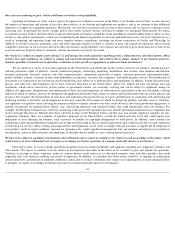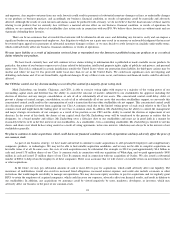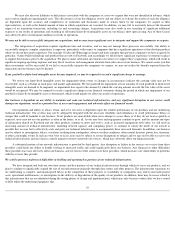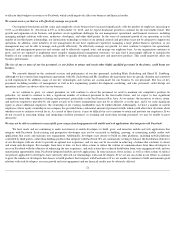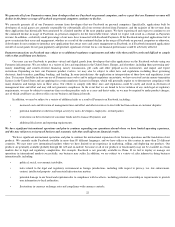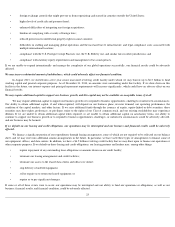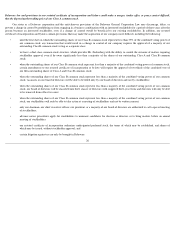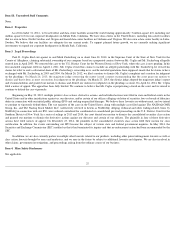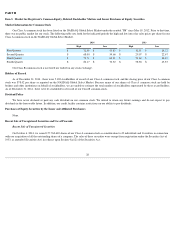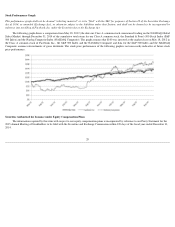Facebook 2014 Annual Report Download - page 22
Download and view the complete annual report
Please find page 22 of the 2014 Facebook annual report below. You can navigate through the pages in the report by either clicking on the pages listed below, or by using the keyword search tool below to find specific information within the annual report.
We may also discover liabilities or deficiencies associated with the companies or assets we acquire that were not identified in advance, which
may result in significant unanticipated costs. The effectiveness of our due diligence review and our ability to evaluate the results of such due diligence
are dependent upon the accuracy and completeness of statements and disclosures made or actions taken by the companies we acquire or their
representatives, as well as the limited amount of time in which acquisitions are executed. In addition, we may fail to accurately forecast the financial
impact of an acquisition transaction, including tax and accounting charges. Acquisitions may also result in our recording of significant additional
expenses to our results of operations and recording of substantial finite-
lived intangible assets on our balance sheet upon closing. Any of these factors
may adversely affect our financial condition or results of operations.
We may not be able to successfully integrate our acquisitions, and we may incur significant costs to integrate and support the companies we acquire.
The integration of acquisitions requires significant time and resources, and we may not manage these processes successfully. Our ability to
successfully integrate complex acquisitions is unproven, particularly with respect to companies that have significant operations or that develop products
where we do not have prior experience. For example, Oculus and WhatsApp are larger and more complex than previous companies we have acquired. In
particular, Oculus builds technology and products that are new to Facebook, and accordingly we did not have significant experience or structure in place
to support this business prior to the acquisition. We plan to make substantial investments of resources to support these acquisitions, which will result in
significant ongoing operating expenses and may divert resources and management attention from other areas of our business. We cannot assure you that
these investments will be successful. If we fail to successfully integrate the companies we acquire, we may not realize the benefits expected from the
transaction and our business may be harmed.
If our goodwill or finite
-lived intangible assets become impaired, we may be required to record a significant charge to earnings.
We review our finite-
lived intangible assets for impairment when events or changes in circumstances indicate the carrying value may not be
recoverable, such as a decline in stock price and market capitalization. We test goodwill for impairment at least annually. If such goodwill or finite-
lived
intangible assets are deemed to be impaired, an impairment loss equal to the amount by which the carrying amount exceeds the fair value of the assets
would be recognized. We may be required to record a significant charge in our financial statements during the period in which any impairment of our
goodwill or finite-lived intangible assets is determined, which would negatively affect our results of operations.
Our business is dependent on our ability to maintain and scale our technical infrastructure, and any significant disruption in our service could
damage our reputation, result in a potential loss of users and engagement, and adversely affect our financial results.
Our reputation and ability to attract, retain, and serve our users is dependent upon the reliable performance of our products and our underlying
technical infrastructure. Our systems may not be adequately designed with the necessary reliability and redundancy to avoid performance delays or
outages that could be harmful to our business. If our products are unavailable when users attempt to access them, or if they do not load as quickly as
expected, users may not use our products as often in the future, or at all. As our user base and engagement continue to grow, and the amount and types
of information shared on Facebook and our other products continue to grow and evolve, such as increased engagement with video, we will need an
increasing amount of technical infrastructure, including network capacity and computing power, to continue to satisfy the needs of our users.It is
possible that we may fail to effectively scale and grow our technical infrastructure to accommodate these increased demands. In addition, our business
may be subject to interruptions, delays, or failures resulting from earthquakes, adverse weather conditions, other natural disasters, power loss, terrorism,
or other catastrophic events. If such an event were to occur, users may be subject to service disruptions or outages and we may not be able to recover our
technical infrastructure and user data in a timely manner to restart or provide our services, which may adversely affect our financial results.
A substantial portion of our network infrastructure is provided by third parties. Any disruption or failure in the services we receive from these
providers could harm our ability to handle existing or increased traffic and could significantly harm our business. Any financial or other difficulties
these providers face may adversely affect our business, and we exercise little control over these providers, which increases our vulnerability to problems
with the services they provide.
We could experience unforeseen difficulties in building and operating key portions of our technical infrastructure.
We have designed and built our own data centers and key portions of our technical infrastructure through which we serve our products, and we
plan to continue to significantly expand the size of our infrastructure primarily through data centers and other projects. The infrastructure expansion we
are undertaking is complex, and unanticipated delays in the completion of these projects or availability of components may lead to increased project
costs, operational inefficiencies, or interruptions in the delivery or degradation of the quality of our products. In addition, there may be issues related to
this infrastructure that are not identified during the testing phases of design and implementation, which may only become evident after we have started
to fully utilize the underlying equipment, that
19









